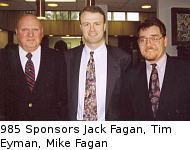10/28/2008
Washington: Camera Companies Oppose Congestion Reduction MeasureRed light camera makers fund battle against Washington state ballot initiative designed to fight congestion.

Special interest groups are going all out in an effort to thwart an anti-congestion referendum in Washington state. Next Tuesday, voters will consider Initiative 985 which, if adopted, would force local jurisdictions to synchronize traffic signals at high-volume intersections, open High Occupancy Vehicle (HOV) lanes during non-peak hours and prohibit the imposition of tolls to raise general revenue (view details). I-985 pays for the synchronization mandate by, among other things, diverting the proceeds from the use of red light cameras into a traffic congestion relief fund.
The revenue provisions have sparked the bulk of the opposition from groups that stand to lose money if voters approve the measure. Nearly a quarter of the $152,969 raised for the "No on 985" effort came from Signal Electric and American Traffic Solutions, companies involved in traffic camera projects.
I-985 places no limitations on cities interested in installing red light cameras for safety. The measure's co-sponsor, Tim Eyman, says that by taking away the profit, the proposal would only stop local governments if they intend to install cameras to raise money. After I-985 qualified for the ballot, five cities dropped plans to adopt photo enforcement. In Wenatchee, one of the five cities, Mayor Dennis Johnson did not mention safety when he admitted to a local reporter that the initiative eliminated the incentive to install cameras.
"Oops, looks like the 'no' campaign hadn't distributed its talking points in time for that Wenatchee World (newspaper) story," Eyman said mockingly in an email.
Other reliable advocates for ticket cameras, including the Seattle's two main newspapers, have run as many stories and editorials as possible in an attempt to derail the initiative's likely passage.
"Vote in favor of the initiative and your kid will get smashed in the legs by fenders of a car running a red light, or your grandmother killed as she uses a crosswalk after getting off a bus," Seattle Post-Intelligencer columnist Joel Connelly wrote.
Despite the hysterical rhetoric, Seattle's own progress report on red light camera usage showed that, if anything, accidents increased after the city installed the devices (view report).
Toll road firms were the next largest financial backers of the anti-985 effort, bringing $20,000 to the table. The American Council of Engineering Companies Washington, HDR Engineering, Parsons Brinckerhoff and Wilbur Smith Associates all fear a loss of business if the measure passes and tolling no longer become an option for state officials to balance the budget.
US Department of Transportation has championed the cause of allowing states to use tolls to raise general revenue and recently began an effort to influence the I-985 vote. A top official issued grave warnings earlier this month about the "degradation of transit performance" if voters approve the measure. The Federal Highway Administration issued an "October surprise" letter last week designed to raise doubt in voters minds about a possible loss of federal funding as a result of the I-985 provision that would open HOV lanes in off-peak hours. Such advocacy is prohibited by the Hatch Act.
"A [federal] employee may not use his official authority or influence for the purpose of interfering with or affecting the result of an election," 5 US Code Section 7323 states.
The changes I-985 proposes to HOV lane usage in Washington state mirror the way the lanes operate for federal employees who use carpool lanes to drive to and from work in the nation's capital each day, opening to general purpose use after 9am and 6pm.


